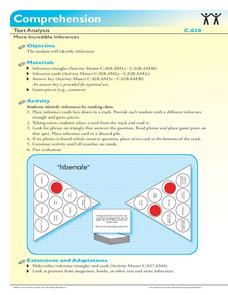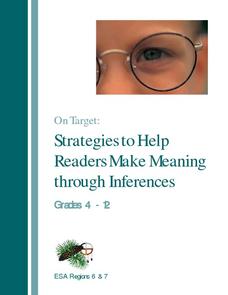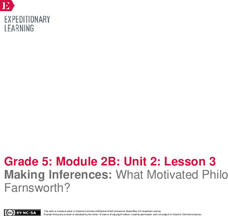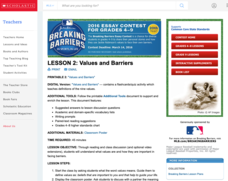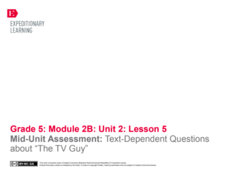K12 Reader
What Do You See? (Inferences)
Making inferences is a skill that goes beyond the comprehension of written text. In this simple exercise, young learners are provided with a photograph and asked to answer a series of inference questions using only on the information...
Florida Center for Reading Research
Comprehension: Text Analysis, More Incredible Inferences
Reinforce inference skills with a learning game! Scholars read scenarios on cards and match them to a written inference on the triangle. The first pupil to match all their inferences wins!
Pearson
Making Inferences
The ability to make inferences is an important skill. Provide your class with some practice. This resource includes several different passages with which learners are required to practice inferring. They read each passage and respond to...
Curated OER
Mini-Lesson Planning for Inferences
Making inferences and drawing conclusions is a key component to successful active reading. Encourage your class to use context clues and prior knowledge to infer different elements of a story, including the setting, plot, and character...
K12 Reader
Inference Practice: Who Am I?
Have a little fun teaching your class about inferences with this short and simple guess who exercise. Provided with five short passages describing different types of people, young learners must read each one and use the included details...
City College of San Francisco
Making Inferences: Reading Between the Lines
Have you ever read part of a story and had to figure out what the rest was about? Practice making inferences with several short passages and multiple choice questions.
Bethel School District
Observations and Inference
What's the difference between qualitative and quantitative observations? Learners make observations, inferences, and predictions about their environment with a set of questions and activities that are applicable to either language arts...
Curated OER
On Target: Strategies to Help Readers Make Meaning through Inferences
Here's a resource that explicitly teaches, models, and provides readers with opportunities to practice the process of drawing inferences from text. Packed with strategies elementary, middle, and high school teachers can use, the resource...
EngageNY
Making Inferences: What Motivated Philo Farnsworth?
Turn on the tube. Learners take a look at pages 10-13 of The Boy Who Invented TV. They work in groups and complete a first read to determine the gist of the section. They then reread the pages to make and revise previous inferences and...
K12 Reader
Inference Practice: Where Am I?
Have your pupils try a hand at making inferences. The worksheet includes five different descriptions, and learners must infer where they think the passage is happening and provide some explanation. A straightforward resource for...
Greater Clark County Schools
Observations and Inferences
A cartoon from the far side of Gary Larsen's wacky world provides an opportunity for critical thinkers to practice their skills distinguishing between observations and inferences. What fun.
K12 Reader
Visual Clues
Whether you realize it or not, reading an image and reading a text require similar skills, including the ability to make inferences. For this simple worksheet, children look at a picture of a snowy winter day and answer a series of...
EngageNY
Making Inferences: What Motivated Philo Farnsworth?
Learners continue their work in The Boy Who Invented TV by examining pages 14-17. They work together to determine the gist of the section during a first read then complete a second read to make inferences, create a summary, and define...
EngageNY
Inferring Author’s Opinions and Writing Opinion Statements: Journalists’ Opinions about Segregation Post–World War II (Promises to Keep, Pages 22–25)
Let's play ball! Scholars summarize information from Promises to Keep about segregation in professional baseball after World War II. They then listen as the teacher reads pages 22-25 aloud. Pupils write the gist in their journals of the...
EngageNY
Building Background Knowledge and Making Inferences: What Is a Natural Disaster?
That's a disaster! Scholars complete a gallery walk to view images and make inferences about natural disasters. They fill out a note catcher about what they observe and infer any questions they may have. They then participate in a World...
EngageNY
Introducing Promises to Keep and Drawing Inferences: Who Is Jackie Robinson and Why Is He Important? (Promises to Keep, Pages 6–7)
Scholars take a picture walk through the book Promises to Keep: How Jackie Robinson Changed America. They make predictions and complete a Notice/Wonder/Inference note catcher. They then define and analyze words on pages six and seven of...
Polk Bros Foundation
I Can Infer Predictions Based on an Analysis of Motive
Use a character or person's motivation as the basis for a prediction of that character or person's next action. Pupils select an individual from their reading, copy a quote, write down an inference about that character's motives, and...
EngageNY
Making Inferences About Informational Text: Science Talk on How My Insect Contributes to the Rainforest Ecosystem
We need to talk. Learners participate in a science talk by discussing the idea of how insects are important to the rainforest. They record notes about their conversations as they talk. For homework, pupils add to their field journals.
National Park Service
A Tale of Two Men
Theodore Roosevelt and the Marquis de Mores were both born in 1858, and both came to the Dakota territory in 1883, but they influenced the developing country of America in different ways. Elementary and middle schoolers apply written and...
Scholastic
Lesson 2: Values and Barriers
Scholars investigate and discuss the importance of values and how they can be used to break barriers. Small groups work collaboratively to examine the text and draw inferences to answer questions. A writing assignment challenges pupils...
EngageNY
Mid-Unit Assessment: Text-Dependent Questions about “The TV Guy”
Say hi to the TV guy. Readers finish their mid unit assessments by reading The TV Guy and answering text-dependent questions. Learners complete multiple choice as well as short and long answer questions pertaining to comprehension,...
Polk Bros Foundation
I Can Infer Motive and Effects for an Action
Help your pupils determine just what makes a character or person tick by zooming in on one character or person. This graphic organizer is dedicated to analyzing one person and asks pupils to infer a personality trait, note down an action...
Polk Bros Foundation
I Can Identify/Infer Motive
Why do people and characters act as they do? Require your class figure out the motivation of two people or characters they read about in a given text. In the short charts, pupils note down who, what they do, and why they do it. After...
Polk Bros Foundation
I Can Sequence Important Events
After reading any short informational or fictional text, ask your class to analyze the important events. They note down three important events on a short timeline, describing the events with either words or drawings. After this, pupils...



